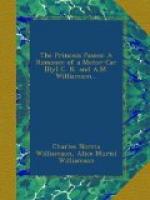St. Bruno, fortunate in many ways, was a lucky saint to have so beautiful a bridge named after him. And as we climbed the brown road—moist with tears wept by the mountains for the banished monks—it seemed to us that the scenery was always leading up to him, as a preface leads up to the first chapter of a book. We went through tunnels as a thread goes through the eye of a needle; we wound round intricate turns of the road; we came upon pinnacle rocks; and then, at last, when we least expected the climax of our journey, we dropped into a great green basin, rimmed with soaring crags. In the midst stood an enormous building, a vast conglomeration of pointed, dove-grey roofs and dun-coloured walls, a city of slate and stone spread over acres of ground and seeming a part of the impressive yet strangely peaceful wilderness.
Looking at the vast structure, I was ready to believe that St. Bruno had waved his staff in the shadow of a rough-hewn mountain, saying: “Let there be a monastery,” and suddenly, there was a monastery; but our motor, quivering with nervous energy before a door in the high wall, snatched me back to practicalities.
Molly, leaning quietly back in the tonneau beside the Perpetual Mushroom, saw us coming from afar off, and waved a hand of absurd American smallness. By the time we were within speaking distance, she was out of the car and coming toward us.
“We were so hungry, that we lunched while we waited,” she explained, “so now you and Jack can go to the hotellerie and have something quickly. We’ll walk in the woods until you come back, and then, as Mercedes doesn’t seem to mind, we’ll all go into the monastery together.”
It was not until the door of the Grande Chartreuse had opened to receive us, and closed again behind our backs, shutting us into a large empty quadrangle, that the Spirit of the place took us by the hand.
Over the steep grey roofs (pointed like monkish hands with finger-tips joined in prayer) we gazed up at mountain peaks, grey and green, and pointing also to a heaven which seemed strangely near.
The spell of the vast, the stupendous silence fell upon us. Somehow, Molly drifted from me to Jack as we walked noiselessly on, led by a silent guide, as if she craved the warm comfort of a loved presence, and for a few brief moments the veiled Mercedes paced step for step beside me. But we did not speak to each other.
What a tragic, tremendous silence it was! Yes, I wanted the Boy. I should have been glad of the touch of his little shoulder. Thinking of him thus, by some accident the sleeve of Mercedes’s coat brushed against mine. Still, not a word from either of us. I did not even say, “I beg your pardon,” for that would have been to obtrude my voice upon the thousand voices of the Silence; dead voices, living voices; voices of passionate protest, voices of heartbreaking homesickness, of aching grief and longing, never to be assuaged. Poor monks—poor banished men who had loved their home, and belonged to it, as the clasping tendrils of old, old ivy belong to the oak.




